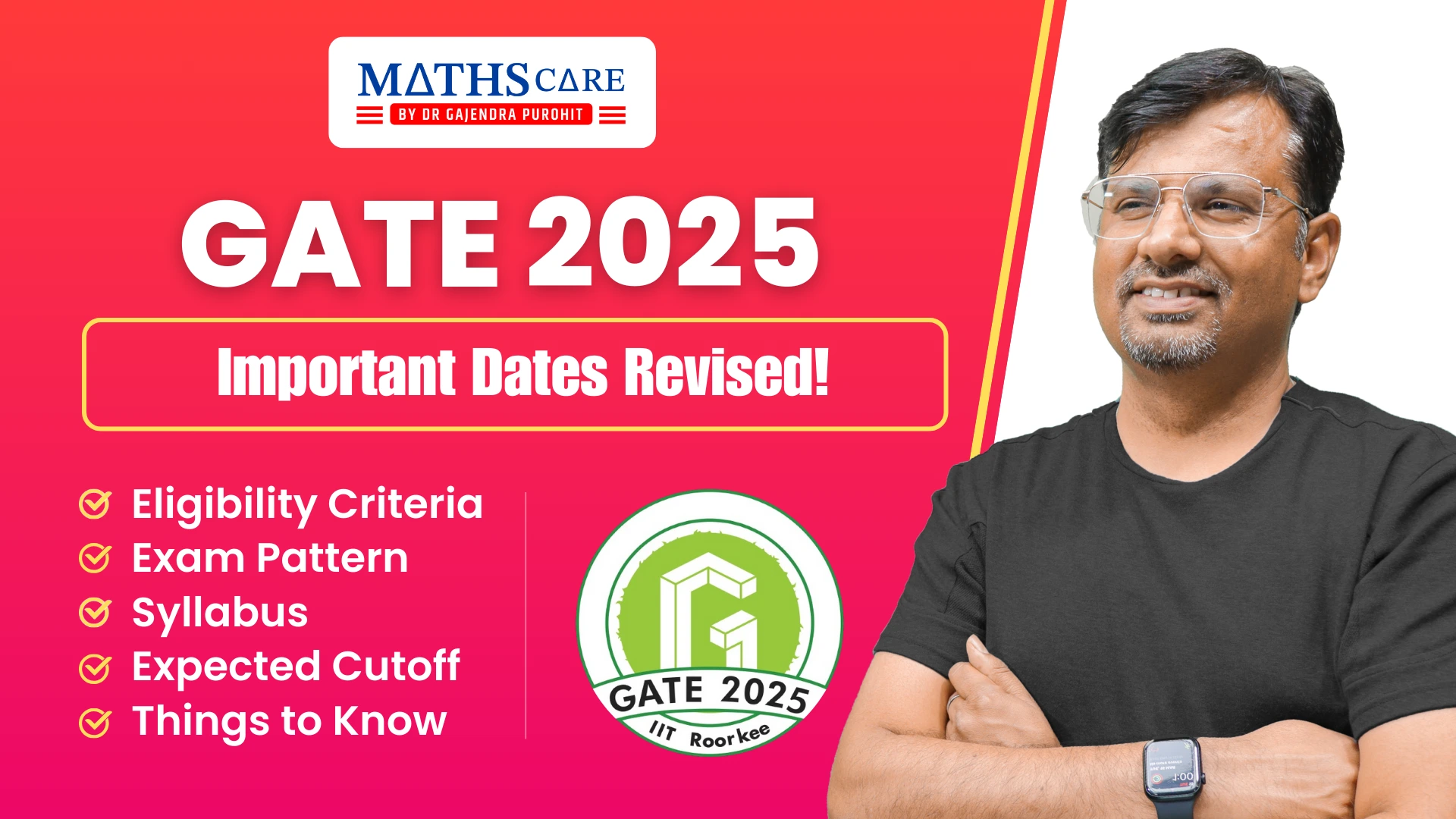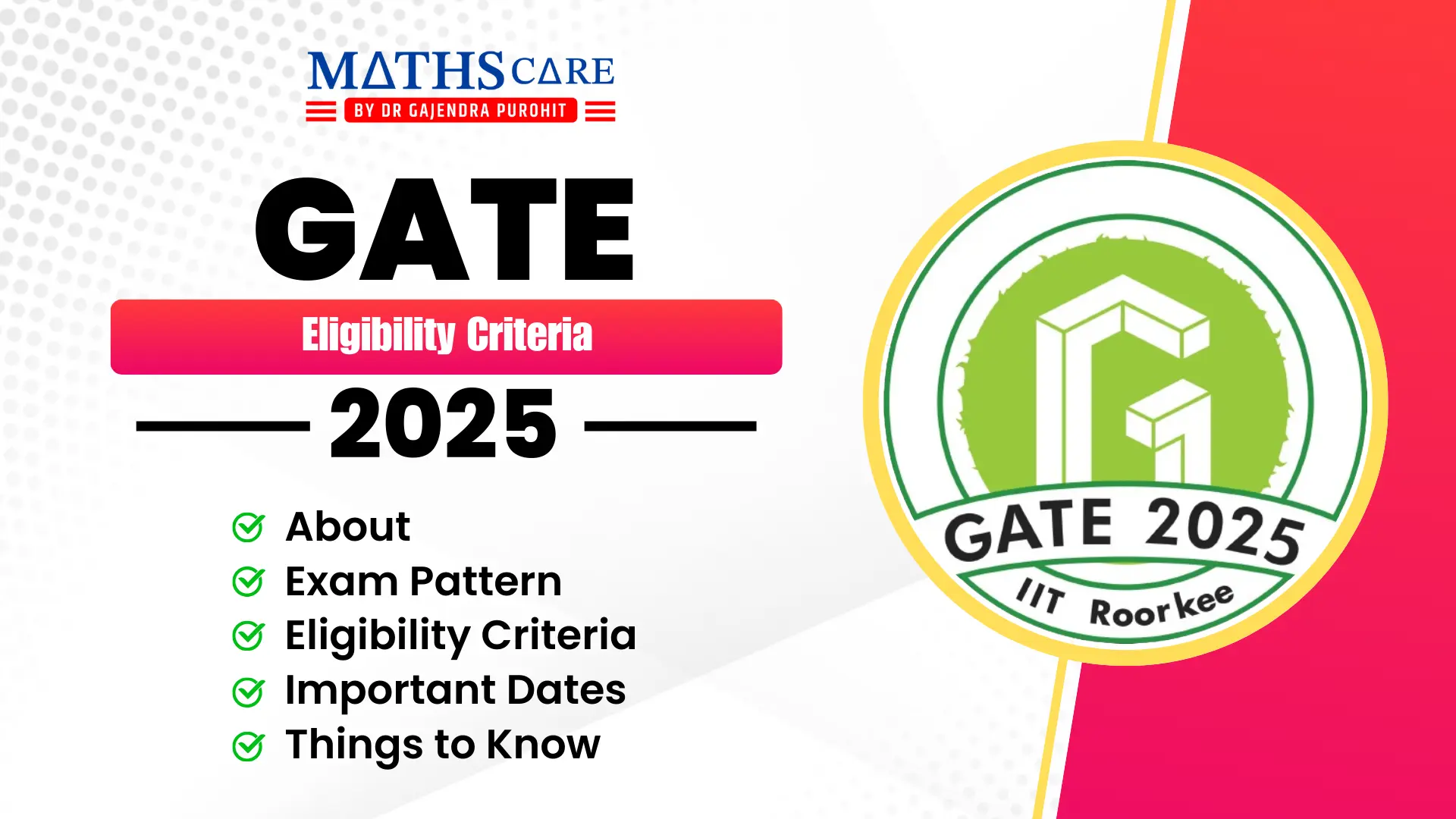GATE 2025 Important Dates Revised!
If you’re preparing for Graduate Aptitude Test in Engineering (GATE) staying on top of the key dates is crucial for success. In this blog, we’ll dive into the revised schedule, discuss the GATE eligibility criteria, exam pattern, and provide useful insights on how you can utilize this information to optimize your preparation.

About GATE 2025
The Graduate Aptitude Test in Engineering (GATE) is a national-level exam that tests your comprehensive understanding of various undergraduate subjects in engineering, technology, architecture, and post-graduate subjects in science. GATE scores are widely used for admission into master’s programs, direct Ph.D. admissions, and even for job recruitment in Public Sector Undertakings (PSUs).
It is an essential exam for anyone looking to advance their education or career in technical fields. The GATE exam is conducted jointly by the Indian Institute of Science (IISc) and seven IITs, and is held every year, typically in February.
GATE 2025 Revised Dates
| Event. | Date |
| Opening Date for (GOAPS) | 24th August 2024 (Saturday) |
| Closing Date for(Without Late Fee) | 26th September 2024 (Thursday) |
| Closing Date of Extended Online Registration (With Late Fee) | 7th October 2024 (Monday) |
| GATE 2025 Examination Dates | 1st February 2025 (Saturday), 2nd February 2025 (Sunday), 15th February 2025 (Saturday), 16th February 2025 (Sunday) |
GATE 2025 Eligibility Criteria
To appear for GATE 2025, you must meet the following eligibility criteria:
Educational Qualification: You must have completed or be in the final year of your Bachelor’s Degree in Engineering, Technology, or Architecture. Students pursuing a Master’s Degree in Science or relevant fields can also apply.
Age Limit: There’s no age limit for GATE. Whether you’re a recent graduate or someone looking to switch careers, GATE is open to all.
Nationality: Both Indian nationals and international candidates from countries like Nepal, Bangladesh, Sri Lanka, Singapore, and others can apply for GATE.
GATE 2025 Syllabus (Mathematics Focus)
While the GATE exam syllabus covers multiple streams, Mathematics forms an integral part of many papers, especially for students in engineering disciplines. Here’s a quick overview of topics to cover for mathematics:
Linear Algebra
Calculus
Differential Equations
Complex Analysis
Probability and Statistics
Numerical Methods
Make sure to download the official GATE 2025 syllabus from the official website and cross-reference it with your study material.
Why GATE?
Wondering why you should consider GATE? Here’s a breakdown of opportunities you unlock:
Admission to MTech programs at IITs, NITs, and other top institutions.
Opportunity for Ph.D. programs and research positions in prestigious institutes.
Recruitment offers from more than 250 PSUs like BHEL, GAIL, NTPC, and ONGC.
GATE scores are also recognized by top foreign universities, opening up international study and work opportunities.
GATE 2025 Exam Pattern
Understanding the exam pattern is the first step towards effective preparation. The GATE 2025 exam follows a specific structure:
Exam Mode: Online (Computer-Based Test)
Duration: 3 hours
Total Marks: 100
Number of Questions: 65 questions (10 General Aptitude + 55 Subject-Specific Questions)
The paper comprises both multiple-choice questions (MCQs) and numerical answer type (NAT) questions. There is negative marking for wrong answers in MCQs, so make sure to answer carefully.
GATE Cut-off
The cut-off for GATE varies every year, depending on the number of candidates and the difficulty level of the paper. However, for a general idea:
In recent years, the cut-off for General Category ranges between 25 to 35 marks for most streams.
For OBC-NCL, it ranges between 22 to 30 marks.
For SC/ST/PwD, it’s generally between 16 to 24 marks.
Keeping track of previous years’ cut-off trends can help you gauge the competition and set a realistic target.
Five-Month Study Target for GATE
If you’re preparing to crack the GATE exam in five months, you need a focused and well-structured study plan. Here’s how you can effectively distribute your time and effort:
1. Complete the Syllabus (3 months)
In the first three months, focus on completing the entire GATE syllabus. Divide your subjects evenly, ensuring you cover all topics comprehensively. Stick to reliable GATE reference books that present concepts in a simplified manner, such as standard textbooks and well-reviewed GATE-specific guides. Prioritize understanding over memorization.
To manage time effectively, break your study sessions into blocks and assign specific topics to each block. This will help you cover material in an organized fashion while avoiding burnout. Aim to complete smaller sections daily so that by the end of three months, you have tackled the full syllabus without cramming.
2. Daily Study (5-6 hours)
Devote 5-6 hours each day to focused study sessions. Consistency is key when preparing for GATE in a short period. Each session should prioritize deep understanding rather than skimming through topics. Start with the more challenging topics in the first two hours when your concentration is higher, and shift to lighter ones later.
Use these hours to also revisit important concepts, brush up on formulas, and practice solving problems alongside theory. It’s important to vary your methods—reading, writing, and solving problems—to reinforce learning.
3. Daily Practice: Solve 50-60 Questions
Practice is the cornerstone of success in any competitive exam, especially GATE. Solve 50-60 questions daily to improve both your speed and accuracy. Try to practice questions from different sections each day so that you remain well-rounded in your preparation.
As GATE has multiple question types like MCQs, MSQs, and numerical problems, make sure your practice covers all types. This will help you become familiar with the pattern and adapt to any question style during the exam.
4. General Aptitude Practice
The General Aptitude section is crucial in boosting your overall GATE score. Dedicate at least an hour every other day to working on this section. Regular practice in this area can significantly improve your chances of scoring higher, as this section is relatively easy to score in with the right preparation. Use question banks, mock tests, and previous years’ question papers to familiarize yourself with common patterns.
Working on verbal and numerical ability problems consistently will also help develop a strong grasp of logic, data interpretation, and critical thinking skills, all essential to ace this part of the exam.
5. Mock Exams in 3-Hour Blocks
Mock tests are a great way to simulate the actual exam environment and assess your preparation. At least once a week, set aside three hours to take a mock test in a controlled, distraction-free environment.
Mimicking exam conditions will help you get used to the time constraints and exam pressure. This practice will also help you develop effective time management skills and identify weak areas where you need more work. Analyze your performance after each mock test, noting where you lost marks, and make necessary adjustments to your study plan.
6. Revise and Refine Strategy (Last 2 Months)
In the final two months, your primary focus should shift to revision and practice tests. Having completed the syllabus, now is the time to revisit core concepts and formulas, ensuring everything is fresh in your memory. Use this time to work on weak areas identified through mocks, and review important topics more thoroughly.
The last two months should also include more intense practice of previous years’ GATE questions, as they give you an accurate sense of the exam’s difficulty level and common question types..
What After GATE?
After GATE, several opportunities open up, both in higher education and the job market.
Higher Education Sector
MTech at IITs, IIMs, or international universities.
MS programs at universities like Aachen University (Germany), Nanyang Technical University (Singapore), and National University of Singapore.
MBA from top Indian institutes like IIMs and NITIE.
Job Sector
You can secure high-paying jobs in more than 250 PSUs, including companies like:
Bharat Petroleum Corporation Limited (BPCL)
Coal India Limited
GAIL
Indian Oil Corporation Limited (IOCL)
NTPC Limited
The salary packages are competitive, ranging from ₹20 to ₹22 lakhs annually for Maharana and Navratna PSUs.
Conclusion
Cracking GATE 2025 requires strategic planning, consistency, and dedicated effort. With the revised dates, you have ample time to prepare thoroughly. Make sure to focus on understanding the concepts rather than rote learning. Follow the three-month preparation strategy and leverage the GATE opportunities for a brighter future, whether in higher education or the job sector.
Best of luck with your GATE 2025 journey!
GATE FAQS
What is GATE Exam form fees?
The application fee is Rs. 900 for female, SC, ST, and PwD candidates, and Rs. 1800 for general category candidates. To apply for GATE exam, candidates must meet the specified GATE exam eligibility criteria, which have been outlined in the information brochure.
Who is going to conduct GATE 2025?
GATE 2025 is being organised by Indian Institute of Technology Roorkee (IITR).
Is the GATE result out for 2024?
The GATE 2024 result was released on March 16, 2024, by IISc Bangalore. Candidates can access their results through the GOAPS portal at gate2024.iisc.ac.in. Alongside the result, cutoffs and merit lists were also published for various branches.
What is a good GATE rank?
A GATE rank below 200 is considered good for securing admission to prestigious institutions for postgraduate courses. For IIT admissions, ranks between 600 and 800 can also be competitive, with ideal scores ranging from 400 to 800 based on the previous year’s cutoffs
Is GATE harder than JEE?
GATE is considered tougher than JEE due to its extensive syllabus and challenging numerical questions. It opens doors to higher education, research, and PSU jobs, making it a crucial exam for engineering graduates.
How many students appeared in GATE 2024?
8,26,239 candidates registered for GATE 2024,amongst which 6,53,292 appeared while only 1.29 lakh candidates qualifying the exam. Compared to the previous year, 25% more applications were received this year.
BEST OFFERING COURSES FOR YOU
BEST BOOKS FOR IIT JAM/ CSIR-NET
BUY BOOKS ON OUR APP
RECENT POSTS

GATE 2025 Admit Card Release Date

GATE 2025 Strategy for Last Month

GATE Eligibility Criteria 2025







